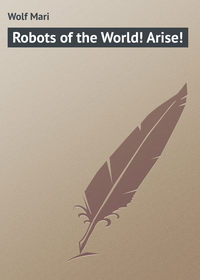 полная версия
полная версияThe First Day of Spring
The lock opened. Captain Bernard stepped out and went down the ladder to the ground. The others followed him. Within a few minutes the ship stood empty.
Trina breathed the open air of the planet and felt the warmth on her face and smelled the scent of grass and the elusive fragrance of alien flowers. She heard the song of some strange, infinitely sweet throated bird.
"It's – it's Earth," she whispered.
Voices, eager, calling voices, sang out in the distance. Then, little cars rolled toward them through the field, mowing down the grass, cutting themselves a path to the ship. People, men and women and children, were calling greetings.
"This is where we landed before," Max said. "We told them we'd be back."
They were sunbronzed, country people, and except for their strange clothing they might have been from any of the worlds. Even their language was the same, though accented differently, with some of the old, unused words, like those in the legends.
"You've brought your people?" the tall man who stood in the forefront said to Captain Bernard.
"They're up there." Bernard pointed up at the sky, and the people looked up. Trina looked up too. One of the planet's moons was almost full overhead. But the world was invisible, shut off by the sky and the clouds and the light of the earthlike sun.
"They'd like some of you to come visit their world," Bernard said. "If any of you are willing."
The tall man nodded. "Everyone will want to go," he said. "Very few ships ever land here. Until you came, it had been years."
"You'd go out in space?" Trina said incredulously.
Again the man nodded. "I was a spaceman once," he said. "All of us MacGregors were." Then he sighed. "Sometimes even now I want to go out again. But there've been no ships here, not for years."
Trina looked past him, at the women and the children, at the lush fields and the little houses far in the distance. "You'd leave this?"
MacGregor shook his head. "No, of course not. Not to live in space permanently. I'd always come back."
"It's a fine world to come back to," Max said, and he and the tall man smiled at each other, as if they shared something that Trina couldn't possibly understand.
"We might as well go into town," MacGregor said.
They walked over to the cars. MacGregor stopped beside one of them, his hand on the door button.
"Here, let me drive." The girl stepped forward out of the crowd as she spoke. She was tall, almost as tall as MacGregor, and she had the same high cheekbones and the same laughter lines about her eyes.
"Not this time, Saari," MacGregor said. "This time you can entertain our guests." He turned to Max and Trina and smiled. "My daughter." His face was proud.
They climbed in, Trina wedging herself into the middle of the back seat between Max and the planet girl. The car throbbed into motion, then picked up speed, jolting a bit on the rough country road. The ground rushed past and the fields rushed past and Trina leaned against Max and shut her eyes against the dizzying speed. Here, close to the ground, so close that they could feel every unevenness of its surface, it was far worse than in the windmill like craft the spacemen used on the worlds.
"Don't you have cars?" Saari asked.
"No," Trina said. "We don't need them."
A car like this would rush all the way around the world in half an hour. In a car like this one even the horizons wouldn't look right, rushing to meet them. Here, though the horizons stayed the same, unmoving while the fence posts and the farmhouses and the people flashed past.
"What do you use for transportation then?"
"We walk," Trina said, opening her eyes to look at the girl and then closing them again. "Or we ride horses."
"Oh."
A few minutes later the car slowed, and Trina opened her eyes again.
"We're coming into town," Saari said.
They had climbed up over the brow of a small hill and were now dropping down. At the bottom of the hill the houses clumped together, sparsely at first, then more and more of them, so that the whole valley was filled with buildings, and more buildings hugged the far slopes.
"There are so many of them," Trina whispered.
"Oh, no, Trina. This is just a small town."
"But the people – all those people…"
They crowded the streets, watching the cars come in, looking with open curiosity at their alien visitors. Faces, a thousand faces, all different and yet somehow all alike, blended together into a great anonymous mass.
"There aren't half that many people on the whole world," Trina said.
Saari smiled. "Just wait till you see the city."
Trina shook her head and looked up at Max. He was smiling out at the town, nodding to some men he apparently knew, with nothing but eagerness in his face. He seemed a stranger. She looked around for Curt Elias, but he was in one of the other cars cut off from them by the crowd. She couldn't see him at all.
"Don't you like it?" Saari said.
"I liked it better where we landed."
Max turned and glanced down at her briefly, but his hand found hers and held it, tightly, until her own relaxed. "If you want to, Trina, we can live out there, in those fields."
For a moment she forgot the crowd and the endless faces as she looked up at him. "Do you mean that, Max? We could really live out there?"
Where it was quiet, and the sun was the same, and the birds sang sweetly just before harvest time, where she would have room to ride and plenty of pasture for her favorite horse. Where she would have Max, there with her, not out somewhere beyond the stars.
"Certainly we could live there," he said. "That's what I've been saying all along."
"You could settle down here?"
He laughed. "Oh, I suppose I'd be out in space a good deal of the time," he said. "The ships will come here now, you know. But I'll always come home, Trina. To this world. To you."
And suddenly it didn't matter that the girl beside her chuckled, nor that there were too many people crowding around them, all talking at once in their strangely accented voices. All that mattered was Max, and this world, which was real after all, and a life that seemed like an endless festival time before her.
Evening came quickly, too quickly, with the sun dropping in an unnatural plunge toward the horizon. Shadows crept out from the houses of the town, reached across the narrow street and blended with the walls of the houses opposite. The birds sang louder in the twilight, the notes of their song drifting in from the nearby fields. And there was another sound, that of the wind, not loud now but rising, swirling fingers of dust in the street.
Trina sat in front of the town cafe with the planet girl, Saari. Max Cramer was only a few feet away, but he paid no attention to her, and little to Elias. He was too busy telling the planet people about space.
"Your man?" Saari asked.
"Yes," Trina said. "I guess so."
"You're lucky." Saari looked over at Max and sighed, and then she turned back to Trina. "My father was a spaceman. He used to take my mother up, when they were first married, when the ships were still running." She sighed. "I remember the ships, a little. But it was such a long time ago."
"I can't understand you people." Trina shook her head. "Leaving all of this, just to go out in space."
The room was crowded, oppressively crowded. Outside, too many people walked the shadowed streets. Too many voices babbled together. The people of this planet must be a little mad, Trina thought, to live cooped together as the spacemen lived, with all their world around them.
Saari sat watching her, and nodded. "You're different, aren't you? From us, and from them too." She looked over at Max and Bernard and the others, and then she looked at Curt Elias, who sat clenching and unclenching his hands, saying nothing.
"Yes, we're different," Trina said.
Max Cramer's voice broke incisively into the silence that lay between them then. "I don't see why," he said, "we didn't all know about this world. Especially if more than one ship came here."
Saari's father laughed softly. "It's not so strange. The ships all belonged to one clan. The MacGregors. And eventually all of them either were lost in space somewhere or else grew tired of roaming around and settled down. Here." He smiled again, and his high cheekboned face leaned forward into the light. "Like me…"
Night. Cloudless, black, but hazed over with atmosphere and thus familiar, not like the night of space. The two small moons, the stars in unfamiliar places, and somewhere, a star that was her world. And Trina sat and listened to the planet men talk, and to the spacemen among them who could no longer be distinguished from the native born. Outside, in the narrow street, wind murmured, skudding papers and brush before it, vague shadows against the light houses. Wind, rising and moaning, the sound coming in over the voices and the music from the cafe singers.
It was a stronger wind than ever blew on the world, even during the winter, when the people had to stay inside and wish that Earth tradition might be broken and good weather be had the year around.
"We'd better get back to the ship," Elias said.
They stopped talking and looked at him, and he looked down at his hands, embarrassed. "They'll be worried about us at home."
"No, they won't," Max said. Then he saw the thin, blue-veined hands trembling and the quiver not quite controlled in the wrinkled neck. "Though perhaps we should start back…"
Trina let out her breath in relief. To be back in the ship, she thought, with the needle and its forgetfulness, away from the noise and the crowd and the nervousness brought on by the rising wind.
It would be better, of course, when they had their place in the country. There it would be warm and homelike and quiet, with the farm animals near by, and the weather shut out, boarded out and forgotten, the way it was in winter on the world.
"You're coming with us?" Captain Bernard was saying.
"Yes, we're coming." Half a dozen of the men stood up and began pulling on their long, awkward coats.
"It'll be good to get back in space again," MacGregor said. "For a while." He smiled. "But I'm too old for a spaceman's life now."
"And I'm too old even for this," Elias said apologetically. "If we'd found this planet the other time…" He sighed and shook his head and looked out the window at the shadows that were people, bent forward, walking into the wind. He sighed again. "I don't know. I just don't know."
Saari got up and pulled on her wrap too. Then she walked over to one of the other women, spoke to her a minute, and came back carrying a quilted, rough fabricked coat. "Here, Trina, you'd better put this on. It'll be cold out."
"Are you going with us?"
"Sure. Why not? Dad's talked enough about space. I might as well see what it's like for myself."
Trina shook her head. But before she could speak, someone opened the door and the cold breeze came in, hitting her in the face.
"Come on," Saari said. "It'll be warm in the car."
Somehow she was outside, following the others. The wind whipped her hair, stung her eyes, tore at her legs. The coat kept it from her body, but she couldn't protect her face, nor shut out the low moaning wail of it through the trees and the housetops.
She groped her way into the car. The door slammed shut, and the wind retreated, a little.
"Is it – is it often like that?"
Saari MacGregor looked at her. Max Cramer turned and looked at her, and so did the others in the car. For a long moment no one said anything. And then Saari said, "Why, this is summer, Trina."
"Summer?" She thought of the cereal grasses, rippling in the warm day. They'd be whipping in the wind now, of course. The wind that was so much stronger than any the world's machines ever made.
"You ought to be here in winter," Saari was saying. "It really blows then. And there are the rainstorms, and snow…"
"Snow?" Trina said blankly.
"Certainly. A couple of feet of it, usually." Saari stopped talking and looked at Trina, and surprise crept even farther into her face. "You mean you don't have snow on your world?"
"Why, yes, we have snow. We have everything Earth had." But snow two feet deep … Trina shivered, thinking of winter on the world, and the soft dusting of white on winter mornings, the beautiful powdery flakes cool in the sunlight.
"They have about a sixteenth of an inch of it," Max said. "And even that's more than some of the worlds have. It hardly ever even rains in New California."
Saari turned away finally, and the others did too. The car started, the sound of its motors shutting out the wind a little, and then they were moving. Yet it was even more frightening, rushing over the roads in the darkness, with the houses flashing past and the trees thrashing in the wind and the people briefly seen and then left behind in the night.
The ship was ahead. The ship. Now even it seemed a safe, familiar place.
"This isn't like Earth after all," Trina said bitterly. "And it seemed so beautiful at first."
Then she saw that Saari MacGregor was looking at her again, but this time more in pity than in surprise.
"Not like Earth, Trina? You're wrong. We have a better climate than Earth's. We never have blizzards, nor hurricanes, and it's never too cold nor too hot, really."
"How can you say that?" Trina cried. "We've kept our world like Earth. Oh, maybe we've shortened winter a little, but still…"
Saari's voice was sad and gentle, as if she were explaining something to a bewildered child. "My mother's ancestors came here only a few years out from Earth," she said. "And do you know what they called this planet? A paradise. A garden world."
"That's why they named it Eden," Max Cramer said.
Then they were at the ship, out of the car, running to the airlock, with the grass lashing at their legs and the wind lashing at their faces and the cold night air aflame suddenly in their lungs. And Trina couldn't protest any longer, not with the world mad about her, not with Saari's words ringing in her ears like the wind.
She saw them carry Curt Elias in, and then Max was helping her aboard, and a moment later, finally, the airlock doors slipped shut and it was quiet.
She held out her arm for the needle.
When she awoke again it was morning. Morning on the world. They had carried her to one of the divans in the council hall, one near a window so that she could see the familiar fields of her homeland as soon as she awoke. She rubbed her eyes and straightened and looked up at the others. At Elias, still resting on another divan. At Captain Bernard. At Saari and her father, and another man from the planet. At Max.
He looked at her, and then sighed and turned away, shaking his head.
"Are we – are we going back there?" Trina asked.
"No," Elias said. "The people are against it."
There was silence for a moment, and then Elias went on. "I'm against it. I suppose that even if I'd been young I wouldn't have wanted to stay." His eyes met Trina's, and there was pity in them.
"No," Max said. "You wouldn't have wanted to."
"And yet," Elias said, "I went down there. Trina went down there. Her father and I both went out into space." He sighed. "The others wouldn't even do that."
"You're not quite as bad, that's all," Max said bluntly. "But I don't understand any of you. None of us ever has understood you. None of us ever will."
Trina looked across at him. Her fingers knew every line of his face, but now he was withdrawn, a stranger. "You're going back there, aren't you?" she said. And when he nodded, she sighed. "We'll never understand you either, I guess."
She remembered Saari's question of the night before, "Is he your man?" and she realized that her answer had not been the truth. She knew now that he had never been hers, not really, nor she his, that the woman who would be his would be like Saari, eager and unafraid and laughing in the wind, or looking out the ports at friendly stars.
Elias leaned forward on the divan and gestured toward the master weather panel for their part of the village, the indicators that told what it was like today and what it would be like tomorrow all over the world. "I think I understand," he said. "I think I know what we did to our environment, through the generations. But it doesn't do much good, just knowing something."
"You'll never change," Max said.
"No, I don't think we will."
Captain Bernard got up, and MacGregor got up too. They looked at Max. Slowly he turned his head and smiled at Trina, and then he too stood up. "Want to come outside and talk, Trina?"
But there was nothing to say. Nothing she could do except break down and cry in his arms and beg him not to leave her, beg him to spend the rest of his life on a world she could never leave again.
"No," she said. "I guess not." And then, the memories rushed back, and the music, and the little lane down by the stream where the magnolias spread their web of fragrance. "It's – it's almost festival time, Max. Will you be here for it?"
"I don't know, Trina."
It meant no; she knew that.
The weeks slipped by, until it was summer on the world, until the festival music sang through the villages and the festival flowers bloomed and the festival lovers slipped off from the dances to walk among them. There was a breeze, just enough to carry the mingled fragrances and the mingled songs, just enough to touch the throat and ruffle the hair and lie lightly between the lips of lovers.
Trina danced with Aaron Gomez, and remembered. And the wind seemed too soft somehow, almost lifeless, with the air too sweet and cloying.
She wondered what a festival on the planet would be like.
Max, with Saari MacGregor, perhaps, laughing in the wind, running in the chill of evening along some riverbank.
I could have gone with him, she thought. I could have gone…
But then the music swirled faster about them, the pulse of it pounding in her ears, and Aaron swept her closer as they danced, spinning among the people and the laughter, out toward the terrace, toward the trees with leaves unstirring in the evening air. All was color and sound and scent, all blended, hypnotically perfect, something infinitely precious that she could never, never leave.
For it was summer on the world, and festival time again.






